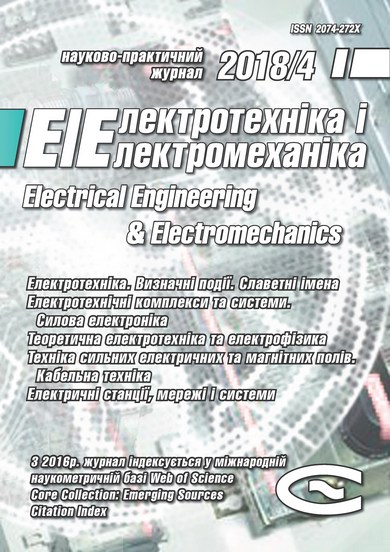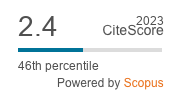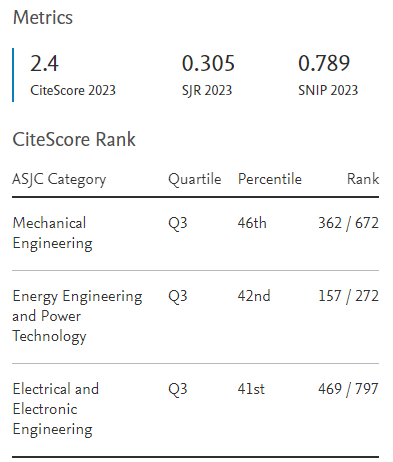OPTIMAL UTILIZATION OF ELECTRICAL ENERGY FROM POWER PLANTS BASED ON FINAL ENERGY CONSUMPTION USING GRAVITATIONAL SEARCH ALGORITHM
DOI:
https://doi.org/10.20998/2074-272X.2018.4.12Keywords:
gravitational search algorithm, energy, electrical energy, economic distribution, final energy consumptionAbstract
Purpose. Energy consumption is a standard measure to evaluate the progress and quality of life in a country. When used properly and logically it could be cause of progress in science, technology and welfare of the people in any country and otherwise irreparable economic losses and economic gross recession would happen. And finally, the quantity of energy consumption per GDP will increase day by day. Electrical energy, as the most prominent type of energy, is very important. In this article based on a different approach, according to the final consumption of electric energy, a proper economic planning in order to supply electrical energy is submitted. In this programming, the details of final energy consumption, will replace with the information of power network, by considering the network efficiency and power plants. Operation of power plants is based on the energy optimization entranced to a plant. By using the proposed method and gravitational search algorithm, the total cost of electrical energy can be minimized. The results of simulation and numerical studies show better convergence of gravitational search algorithm in comparison with other existing methods in this area.References
1. Kuhn H.W., Tucker A.W. Nonlinear Programming. Proceedings of the Second Berkeley Symposium on Mathematical Statistics and Probability, University of California, 1951, pp. 481-492.
2. Yamin H.Y. Review on methods of generation scheduling in electric power systems. Electric Power Systems Research, 2004, vol.69, no.2-3, pp. 227-248. doi: 10.1016/j.epsr.2003.10.002.
3. Yuan X., Su A., Nie H., Yuan Y., Wang L. Application of enhanced discrete differential evolution approach to unit commitment problem. Energy Conversion and Management, 2009, vol.50, no.9, pp. 2449-2456. doi: 10.1016/j.enconman.2009.05.033.
4. Zaman M.F., Elsayed S.M., Ray T., Sarker R.A. Evolutionary Algorithms for Dynamic Economic Dispatch Problems. IEEE Transactions on Power Systems, 2016, vol.31, no.2, pp. 1486-1495. doi: 10.1109/TPWRS.2015.2428714.
5. Surender Reddy S., Bijwe P.R., Abhyankar A.R. Real-Time Economic Dispatch Considering Renewable Power Generation Variability and Uncertainty Over Scheduling Period. IEEE Systems Journal, 2015, vol.9, no.4, pp. 1440-1451. doi: 10.1109/JSYST.2014.2325967.
6. Tang K.S., Man K.F., Kwong S., He Q. Genetic algorithms and their applications. IEEE Signal Processing Magazine, 1996, vol.13, no.6, pp. 22-37. doi: 10.1109/79.543973.
7. Kirkpatrick S., Gelatt C.D., Vecchi M.P. Optimization by Simulated Annealing. Science, 1983, vol.220, no.4598, pp. 671-680. doi: 10.1126/science.220.4598.671.
8. Farmer J.D., Packard N.H., Perelson A.S. The immune system, adaptation, and machine learning. Physica D: Nonlinear Phenomena, 1986, vol.22, no. 1-3, pp. 187-204. doi: 10.1016/0167-2789(86)90240-x.
9. Dorigo M., Maniezzo V., Colorni A. Ant system: optimization by a colony of cooperating agents. IEEE Transactions on Systems, Man and Cybernetics, Part B (Cybernetics), 1996, vol.26, no.1, pp. 29-41. doi: 10.1109/3477.484436.
10. Kennedy J., Eberhart R. Particle swarm optimization. Proceedings of ICNN’95 – International Conference on Neural Networks. doi: 10.1109/icnn.1995.488968.
11. Zarandi M.H.F., Hemmati A., Davari S. The multi-depot capacitated location-routing problem with fuzzy travel times. Expert Systems with Applications, 2011, vol.38, no.8, pp. 10075-10084. doi: 10.1016/j.eswa.2011.02.006.
12. Mitra S., Banka H. Multi-objective evolutionary biclustering of gene expression data. Pattern Recognition, 2006, vol.39, no.12, pp. 2464-2477. doi: 10.1016/j.patcog.2006.03.003.
13. Zahiri S.H. Swarm Intelligence and Fuzzy Systems. Nova Science Publ., USA, 2010.
14. Darby S., Mortimer-Jones T.V., Johnston R.L., Roberts C. Theoretical study of Cu–Au nanoalloy clusters using a genetic algorithm. The Journal of Chemical Physics, 2002, vol.116, no.4, pp. 1536-1550. doi: 10.1063/1.1429658.
15. Coello Coello C.A., Luna E.H., Aguirre A.H. Use of Particle Swarm Optimization to Design Combinational Logic Circuits. Lecture Notes in Computer Science, 2003, pp. 398-409. doi: 10.1007/3-540-36553-2_36.
16. Wolpert D.H., Macready W.G. No free lunch theorems for optimization. IEEE Transactions on Evolutionary Computation, 1997, vol.1, no.1, pp. 67-82. doi: 10.1109/4235.585893.
17. Rashedi E., Nezamabadi-pour H., Saryazdi S. GSA: A Gravitational Search Algorithm. Information Sciences, 2009, vol.179, no.13, pp. 2232-2248. doi: 10.1016/j.ins.2009.03.004.
Downloads
Published
How to Cite
Issue
Section
License
Copyright (c) 2018 Zeinab Montazeri, Taher Niknam

This work is licensed under a Creative Commons Attribution-NonCommercial 4.0 International License.
Authors who publish with this journal agree to the following terms:
1. Authors retain copyright and grant the journal right of first publication with the work simultaneously licensed under a Creative Commons Attribution License that allows others to share the work with an acknowledgement of the work's authorship and initial publication in this journal.
2. Authors are able to enter into separate, additional contractual arrangements for the non-exclusive distribution of the journal's published version of the work (e.g., post it to an institutional repository or publish it in a book), with an acknowledgement of its initial publication in this journal.
3. Authors are permitted and encouraged to post their work online (e.g., in institutional repositories or on their website) prior to and during the submission process, as it can lead to productive exchanges, as well as earlier and greater citation of published work.





